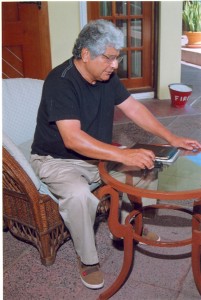The United Kingdom-based publishing company Hansib secured more than G$2m in book sales during the period of Carifesta 2008, according to Arif Ali, the company’s owner.

The Guyanese-born Ali, who runs the largest Caribbean-owned publishing company in Europe told Stabroek Business that Hansib publications sold during Carifesta were valued at more than G$6m but that he was more concerned about using the event to help satisfy what he described as “continuing evidence of a traditional demand among Guyanese for good reading material.”
According to Ali the local response to the availability of books at considerably reduced prices during Carifesta X ought to send a signal both to government and to the private sector that there is a huge market for books in Guyana. “Certainly, the evidence suggests that we may have to review the popular notion that the decline in the practice of reading is due entirely to the advent of television in Guyana,” Ali said.
And according to Ali the evidence provided by Hansib’s book sales during Carifesta ought to encourage government “to provide small local publishing houses with the same kinds of incentives afforded other local investors.” Ali said that he believed that publishing and book distribution ought to be among the local industries that the private sector should be encouraged to take advantage of. “In the final analysis publishing provides an economic opportunity for small local entrepreneurs as well as an opportunity to enhance the culture of reading in Guyana,” he said.
According to Ali other Caribbean countries, including Trinidad and Tobago and Jamaica had taken the lead in the establishment of publishing companies. He said that while the facilities available in the region were still of a lesser quality than those available in Europe and North America, there was no reason why Guyana could not seek to specialize in particular aspects of the trade including binding.
Meanwhile the former publisher of the Caribbean Times, one of Britain’s best known West Indian newspapers, told Stabroek Business that he believed local availability of better publishing facilities can play an important role in encouraging the talents of Guyanese writers. “I have been approached by several Guyanese, some well-known, some not so well known, seeking to have books published and the evidence cannot be denied. There is an abundance of literary talent in Guyana and it needs to be supported by more opportunities for the publishing of books. At the personal level more published books means income for the writers since apart from the local there is also a huge market in the diaspora for titles on Guyana and creative writing by Guyanese writers. What good books will also do is to help market Guyana’s image in the region and overseas,” Ali said.
Meanwhile Ali told Stabroek Business that he is prepared to work with the authorities here to help eradicate the practice of pirating of text books. He said that while many Guyanese probably do not think much about the practice it amounted to “stealing.” He said that pirating could eventually cause major international publishers to stop doing business with Guyana “and that would have implications for the availability of good books of any kind in the country.” Ali said that government should also take account of the fact that the practice of pirating can give Guyana a bad image as far as creating the right conditions for investment are concerned and that this could impact on the outlook of foreign investors as far as doing business in Guyana is concerned.
The UK-based publisher told Stabroek Business that he will be communicating with the Ministry of Education to discuss proposals for collaboration to help eradicate pirating while seeking to provide text books for the country’s schools at affordable prices. “I believe that what we are proposing to do can impact positively on the local education system.” Ali said.




